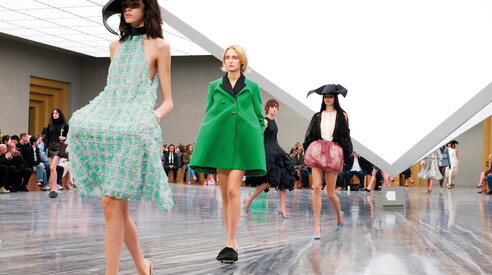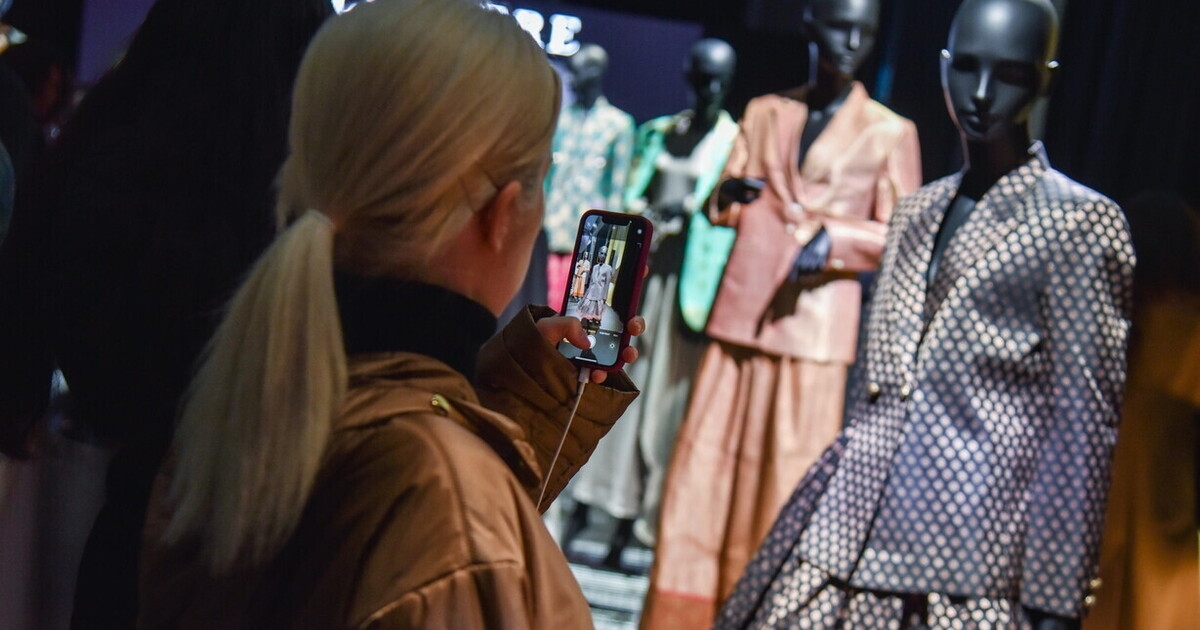Storytelling is over. Fact-checking has arrived.


The final look from the Dior Summer 2026 show, as interpreted by Jonathan W. Anderson (photo courtesy of Dior)
The fashion sheet
A rainy afternoon and a discussion on hot topics with Piquadro CEO Marco Palmieri. After reorganizing the supply chain, Palmieri today moved to selective distribution for the entire group, which includes the French company Lancel. And on the subject of pricing, he's very pragmatic: "We've reached a breaking point."
“What happened to luxury and high-end fashion? Fact-checking arrived, and storytelling was over,” smiles Marco Palmieri , who, in addition to managing Piquadro, The Bridge, and Lancel, acquired seven years ago by Richemont (it's not just the French and Swiss who buy Italian brands, the opposite also happens; the difference is that Italians really like to complain), is also a decidedly attentive startupper. “For years,” he says, “fashion was given a very forced narrative, centered on always-the-same concepts, which were accepted and disseminated without anyone asking too many questions. Then came the crisis, scandals erupted, and scrutiny began on sustainability claims, the defense and support of craftsmanship. Today, the average fashion customer, especially the young one, wants to know and be certain that what they're buying actually matches the words they're told ; they want to know the reasons why it's worth buying. And working with words alone will be much more difficult.” I counter that the young people who are so attentive to sustainability and fairly paid work are also the ones who are supporting Shein, particularly in Europe where the EU legislator dragged its feet on tariffs on Chinese products until the export balance tipped and the first physical store of the ultra-fast fashion leader is about to open in Paris, a consecration that perhaps the Macron government could have spared itself and the entire continent.
On the other hand, however, "reading" the schizophrenic behavior of today's consumer is very difficult, and there will certainly be some twenty-year-old scanning QR codes and smart labels to find out if his jacket was made in Emilia, as the press releases copied and pasted on news sites or on the outskirts of Hanoi tell him, although I don't know a single one. A few weeks ago, Palmieri opened a large new two-story Piquadro store on Corso Matteotti in Milan, right across from Sant'Ambroeus, where we are sipping grapefruit juice on one of those rainy autumn afternoons that you really have to have been born in Milan in the pre-global warming years to love, that is, when the fog was so thick you couldn't see the building across the street. On the ground floor of the Piquadro store are the "hero pieces," as fashion defines the most popular products, and a Ducati model, with which the brand entered into an agreement presented a few months ago at Pitti Uomo that includes a series of roll-top backpacks and trolleys. On the lower level, Palmieri has installed the Experience Lab, a Formula 1 racing simulator, of which Piquadro has been a long-time sponsor in various forms (for the 2024 and 2025 World Championships, it supports the Visa Cash App Racing Bulls F1 Team as Official Luggage Partner and technical consultant), as well as a modular workspace to foster meetings and cross-fertilization of ideas and investors. The move also reflects personal interest: eight years ago, he launched the MyStartup Funding Program, which promotes innovation by rewarding the best business ideas in technology applied to the luggage and fashion accessory industries and awards €100,000 to the most deserving company, in addition to an acceleration program in Silicon Valley. It's said that, in this free, or almost free, networking experience, former RAI president Marinella Soldi, now a non-executive director of the BBC's Commercial Board, is a frequent presence, along with a number of other business-minded female entrepreneurs. Palmieri declined to comment. But he knows where the business is lately, and in fact, in addition to developing its core business (in the first six months of the year, the group's turnover, listed on , was €88.4 million, up 0.7 percent, with a sharp leap forward for The Bridge and Lancel brands, up 6.1 and 9.1 percent, respectively; he admits to having made a clear overhaul—some would say a clean sweep—among the producers of The Bridge brand; the fact that it has grown and significantly increased its appeal demonstrates that it's not always necessary to reduce compensation along the supply chain, and that paying a fair price also rewards results), he has invested, with a stake of approximately thirty percent, in a ski resort in eastern Emilia, Corno alle Scale, almost two thousand meters above sea level, with seventeen ski lifts, a beautiful surrounding panorama and, on the horizon, the sea. It's bitterly cold in winter, "like all the resorts in the Apennines." Flavio Roda, head of the Italian Federation of Ski Resorts (FISI), convinced him, having observed how this hilltop town, with a population of just a few hundred, multiplied its occasional residents by an incredible number in winter, "essentially from two thousand to one hundred thousand." This beautiful place, yet so far off the VIP map or so-called VIPs, must possess many allures, because until a few years ago it was part of the galaxy of Giovanni Zaccanti, an entrepreneur so eclectic as to deal with cured meats (the Parmacotto parenthesis), buttons (Lenzi), and coffee (Saeco and Caffitaly). The Ministry of Tourism partially supported the relaunch, which began in 2020: after a modicum of uncertainty during the pandemic, a new snowhill facility was installed, and other improvements are planned, in addition to a fair amount of personal commitment. Last winter, Palmieri went around on his snowmobile to make sure everything was running smoothly. "Between the ski instructors, the six active lodges, the rental facilities, and the doctor on call, around a hundred people work in Corno during the season," he says. Many of the instructors are employees of local fashion companies, some of them his own, "all qualified, of course." This choice is reminiscent of the glory years of Raja di Panarea, where DJs and summer staff came year after year from the most important advertising and modeling agencies, and was the key to its success. Arriving on the Aeolian Islands, you felt like you were on Via Vincenzo Monti, which for many is a curse, but for many more, a guarantee. Alberto Tomba also often comes to Corno ("Oh, don't you know he's been training there since he was a kid? He's an old friend, we go on some great ski mountaineering trips there"), and in just a few years, it has become an interesting base for networking, which clearly underpins many decisions and evaluations. The idea that the world ran on Teams and WhatsApp didn't last long.
Along with many other aspects of the business that Palmieri, an engineer—so pragmatic, indeed, that his fortune was born the day he grew tired of hearing the thump of a laptop being placed on the floor in an unsuitable bag—is not afraid to dismantle. A certain type of industrial luxury, for example, is a contradiction in terms and has led to progressive disaffection: "Today's fashion is a mass-produced product," supported by storytelling that is "often devoid of content"—in short, hot air, as everyone knows and continues to deny even to themselves—and by "all-the-same values," which inevitably ring false. "What's happening now in the system was largely predictable, but it's a healthy shock," he observes, adding that those who emerge from it will obviously be stronger, less easily attacked. We talk about prices, and the correct ratio between quality and the price printed on the label, and the president of Piquadro points out another fact that would be obvious, were it not for the fact that over the last ten years, many sales managers and CFOs seem to have forgotten it: "Only the market recognizes the correct ratio, but there is also a limit to price stress: breakout is taught in the first year of economics," he smiles wryly. And the breakout in fashion came immediately after the post-pandemic boom, when a large portion of the world, which until the day before had spent without much thought, realized that they had, in fact, spent too much for what they had purchased. Regarding production value and quality, there is another relevant issue: protecting the supply chain, which, after the scandals involving gangmasters, some of which were highly manipulated, is now receiving institutional certification (we wrote about it in the first issue of "Foglio della moda," in April 2021: it took five years to promote some order and put a stop to the lucrative business of private certification). And here, Palmieri knows the situation is even more complicated: many of the fastest-growing brands, such as Polène, produce in Spain. It's cheaper than in Italy, and in some ways less risky, although in some price ranges and certain productions, the quality isn't comparable and the tanning is certainly less gentle. A lot of work will need to be done to improve the public's perception and awareness of the product, as Palmieri knows full well: "With Piquadro, for example, I've increasingly shifted the focus to performance, which translates into functional features, sophisticated materials, and comfort, from the soft handle to the shock-absorbing shoulder straps." In part, he adds, this is why they prefer to sponsor sports, which "is about performance, winning, beating the clock." For this reason, too, to improve "performance," he overhauled Piquadro's distribution, eliminating many stores and regaining control of e-commerce. No one has yet calculated the damage caused by the discounts applied by certain marketplaces, now in crisis, but it's a fact that, for years, online price comparisons by an increasingly savvy and knowledgeable audience have been a source of disagreements and disruptions in sales, as well as sending a bad signal to the entire market. "In the short term, this decision has caused us to lose some revenue, but the prospects are excellent."
More on these topics:
ilmanifesto





